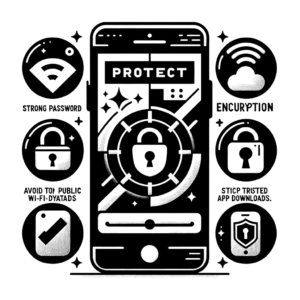What is Insecure Data Storage
Insecure data storage means that when important information is not stored properly or with the right security measures in place, it can be at risk of being accessed by unauthorized people. Mobile devices like smartphones and tablets often contain personal and private data, such as passwords, financial details, and personal files. If this data isn’t kept safe, it can be taken by bad actors, which can lead to privacy violations and identity theft. To avoid insecure data storage on your mobile devices, it’s important to use strong security measures like encryption, regularly update your device’s security features, use passwords, and avoid storing sensitive information in places that aren’t secure. By being proactive in protecting your mobile data, you can lower the chances of having your information stolen and keep your privacy safe.
Implications of Insecure Data Storage
When it comes to mobile data security, the implications of insecure data storage can be detrimental. Storing sensitive information on mobile devices without proper encryption or security measures in place can lead to potential data breaches, unauthorized access, and identity theft. Insecure data storage makes mobile devices vulnerable to cyber attacks, malware, and unauthorized surveillance. This puts user privacy, financial information, and personal data at risk. To prevent these implications, it is crucial to implement strategies such as using strong encryption tools, regularly updating security software, and avoiding insecure Wi-Fi networks. Additionally, enabling two-factor authentication and regularly backing up data to secure cloud storage can help protect mobile data from being compromised. By taking proactive measures to prevent insecure data storage, individuals can safeguard their mobile devices and personal information from various cybersecurity threats.
The Importance of Mobile Data Security

In today’s world where we use our phones and tablets for everything from work to keeping in touch with loved ones, it’s more important than ever to keep our information safe. Hackers are always trying to find ways to access our personal data, so it’s crucial for both individuals and companies to make sure our mobile devices are secure.
Keeping your mobile data safe involves using strong methods to prevent storing data in insecure ways. This means using powerful encryption to protect your data when it’s not being used and when it’s being sent to others. It also means regularly updating your security features and software to fix any known issues. Using strong passwords is important as well to keep out unauthorized users. Another helpful step is using mobile device management tools to keep track of and secure your devices, even if they get lost or stolen.
Protecting your mobile data is important for keeping your personal information safe and maintaining the trust of those who rely on you. By being proactive and taking steps to secure your data, you can reduce the chances of hackers accessing your sensitive information without permission.
Common Threats to Mobile Data Security
Mobile data security is crucial in today’s digital age, with threats constantly evolving to target vulnerabilities in devices and applications. One common threat is insecure data storage, where sensitive information stored on mobile devices can be easily accessed by unauthorized parties. Malware and phishing attacks are also prevalent risks, often leading to data breaches and identity theft. Additionally, unsecured Wi-Fi networks and lost or stolen devices pose significant threats to mobile data security. To protect your mobile data, implementing strong encryption, using secure connections, and regularly updating security software are essential strategies to prevent potential breaches.
Strategies to Prevent Insecure Data Storage
Utilizing Encryption
When it comes to protecting your private information on your phone, encryption is key to keeping it safe from hackers. By using strong encryption methods like AES (which stands for Advanced Encryption Standard), you can make sure that your data stays safe and unreadable to anyone who shouldn’t have access to it. Whether you’re securing files, messages, or calls, using encryption adds an extra layer of security against online threats. And when you use encryption technologies like SSL/TLS for sharing data, you make it even harder for hackers to intercept your information. With encryption in place, you can reduce the chances of your data being stolen and keep your personal details safe.
Leveraging Secure Cloud Storage
In today’s world, it is so important to keep your mobile data safe. One way to do this is by using secure cloud storage. This means that your important information is kept safe from any hackers or online dangers.
As we rely more and more on our mobile phones for work and personal use, it is crucial to make sure that our data is stored in a secure way. By using encryption and authentication techniques, we can make sure that our data is safe and reduce the risk of any breaches.
Secure cloud storage not only allows us to easily access and share files from anywhere, but also provides a reliable and flexible way to keep our mobile data safe. By using these technologies, we can stay one step ahead of any potential cyber threats.
Implementing Strong Authentication Measures
It’s really important to keep your smartphone data safe in today’s digital age, where cyber threats are everywhere. One way to do this is by setting up strong ways for you to prove your identity. You can use things like using your fingerprint or face to log in (biometric authentication), verifying your identity in more than one way (multi-factor authentication), or using a program to help manage your passwords. These methods can add extra layers of protection to your devices and accounts, making it harder for unauthorized people to access your important information. By making sure your data stays safe, you’re also keeping your privacy and identity protected. To stay one step ahead of cybercriminals, make sure you’re using these strong authentication methods to keep your smartphone data secure at all times.
Best Practices for Mobile Data Security
Regularly Updating Software
One of the best ways to protect your personal information on your mobile phone is to regularly update your software. These updates usually include important security improvements that help keep hackers from accessing your data. By staying up to date, you’re giving your device the best defense against cyber threats. Be sure to check for updates often and consider turning on automatic updates to keep your information safe.
Implementing Multi-Factor Authentication
In the modern world of technology, it’s really important to keep your mobile information safe from hackers and data leaks. One way to make sure your mobile device stays secure is by using multi-factor authentication (MFA). This means you have to prove your identity in more than one way, like entering a password, using your fingerprint, or entering a special code. This makes it much harder for someone to get into your device even if they guess your password. By adding MFA to your mobile security, you can feel confident that your private information is well protected from any possible risks.
Promoting Cybersecurity Awareness
In today’s digital world, it’s really important to keep your mobile data safe. There are some simple steps you can take to protect your information from online threats. Make sure to use encryption tools to keep your data secure, and remember to update your mobile devices and apps regularly. Be cautious about connecting to Wi-Fi networks that aren’t secure. It’s also a good idea to use strong passwords and enable biometric authentication on your devices. By staying informed about cybersecurity and practicing smart data storage habits, we can all help make our mobile systems more secure against hackers.
Responsibility of Individual Users
When it comes to keeping your personal information safe on your phone, it’s important for you to take some key steps to protect your data. Making sure you have a strong password and using encryption on your phone are good ways to start. Don’t forget to regularly update your phone’s software and apps to stay ahead of any security issues that could put your data at risk. It’s also a good idea to avoid using public Wi-Fi networks that aren’t secure, as hackers can easily access your information. Be careful about where you download apps from too, and stick to trusted sources to lower the risk of getting any harmful viruses. By being proactive and following these tips, you can help keep your mobile data safe from potential threats.
Responsibility of Corporations in Protecting Data
When it comes to keeping mobile data safe, it’s up to companies to make sure sensitive information is protected from hackers. As more people use mobile devices for work, it’s important for businesses to have strong security in place. This means making sure data is encrypted when it’s being stored and when it’s being sent, having strict rules for passwords, and regularly updating security measures.
Furthermore, corporations need to educate employees on the importance of safeguarding data on mobile devices and provide training on best practices for data security. By taking proactive steps to protect mobile data, corporations can mitigate the risk of data breaches, maintain customer trust, and uphold their reputation in the ever-evolving digital landscape.
